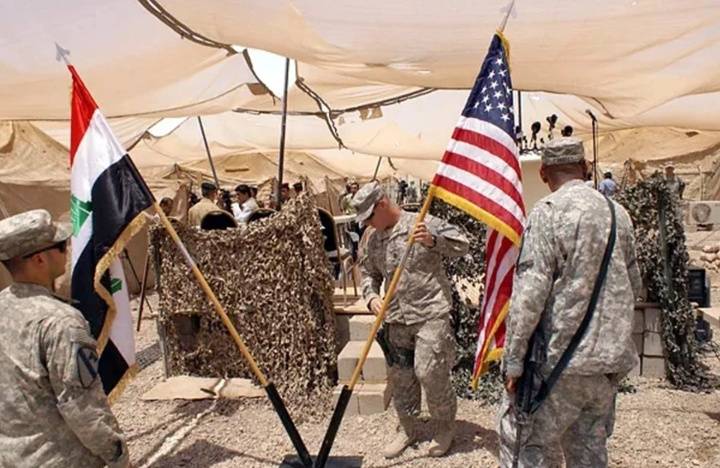3790 Views
The Great Deception: Why U.S. Forces Are Not Really Leaving Iraq
Years after the U.S. invasion and occupation of Iraq, the issue of America’s enduring presence in the country has become one of the most complex and sensitive matters in the region. While Western officials and media constantly speak of a “withdrawal” or “drawdown” of forces, the evidence suggests that what is actually unfolding is not a complete exit, but rather a strategic rearrangement and transformation of the military footprint. This operation, which may rightly be called a “deception maneuver,” aims to reduce political and financial costs both domestically and internationally, while maintaining influence and control over key regional developments.
Rearrangement Instead of Exit: Shifting the Center of Gravity North
The central feature of Washington’s new strategy is the redeployment of forces from large, vulnerable bases in central and western Iraq—such as Ain al-Asad and Victoria—to secure and fortified bases in the Kurdistan Region. While presented publicly as a troop reduction or the end of a combat mission, this is in reality a deliberate military repositioning. By doing so, the U.S. moves its forces beyond the immediate reach of resistance groups active mainly in central and southern Iraq, while also lowering the security and logistical costs of maintaining multiple bases.
Relocating forces to Erbil and the Harir base does not signify leaving Iraq, but rather consolidating forces in an area more politically aligned with Washington and enjoying greater stability. This rearrangement allows the U.S. to preserve a sustainable presence while sidestepping political pressure from Baghdad and the Iraqi parliament’s demands for full withdrawal. In effect, America is transforming its costly, high-risk presence into one that is leaner, more effective, and more durable.
Kurdistan: A Stronghold for Regional Influence
The new focus on Kurdistan offers Washington several advantages. First, it drastically reduces security expenditures. More importantly, the region serves as a launchpad, positioning the U.S. near Iran’s borders and northern Syria. This proximity enables close monitoring and rapid response to developments in two countries Washington views as epicenters of instability.
Furthermore, maintaining a foothold in Kurdistan secures American access to northern Iraq’s energy resources and allows oversight of vital pipelines and transit routes—assets crucial to the global economy and the energy security of U.S. allies in Europe.
Indirect Instruments of Influence: Warfare in the Shadows
With reduced overt military presence, Washington has shifted its strategy toward indirect instruments of influence, including:
1. Military Advisers and Trainers: Hundreds of U.S. personnel remain embedded as “advisers” within the Iraqi army and Kurdish Peshmerga. This ensures Iraq’s continued military dependency on American training and equipment while giving Washington leverage over Iraq’s defense doctrine and security decisions.
2. Intelligence and Drone Operations: Iraqi airspace remains dominated by U.S. reconnaissance and combat drones. These serve as key tools for intelligence gathering, targeting resistance groups, and monitoring rival forces, thereby sustaining deterrence and rapid-response capabilities without large ground deployments.
3. Political and Economic Leverage: The U.S. Embassy in Baghdad—among the largest in the world—functions as a command hub for both diplomatic and intelligence operations. Through economic instruments, financial aid, and political pressure, Washington continues to influence Iraq’s internal affairs and secure its own interests.
This hybrid approach allows the U.S. to retain influence across Iraq’s political and security structures while avoiding the direct burdens of an occupying force.
Managing Iraqi Public Opinion
The “full withdrawal” narrative promoted by U.S. and Western media is essentially a psychological and diplomatic tactic. Its purpose is to pacify Iraqi public opinion, which has long demanded the departure of foreign troops. By creating the illusion that this demand has been fulfilled, Washington seeks to ease pressure on Baghdad and reduce resistance attacks, buying time to entrench its new military posture.
Iraq’s Geostrategic Importance
For Washington, Iraq is far more than a battleground; it is a geostrategic hub. Its position as a bridge between Iran, Syria, and the Gulf, coupled with its vast energy resources, makes it indispensable. The U.S. knows a full withdrawal would create a power vacuum likely to be filled by regional rivals—chiefly Iran. Thus, retaining a strategic base for monitoring these dynamics and ensuring energy flows remains a top priority.
Official Denial of Withdrawal
On August 29, 2025, the U.S. Embassy issued an official statement denying any full withdrawal from Iraq. Though brief, the statement effectively confirmed Washington’s intent to cement its presence, revealing that the “complete exit” narrative was primarily a media tactic. This move underscores America’s unwillingness to openly acknowledge its objectives, preferring instead to signal them implicitly.
Conclusion
The U.S. military presence in Iraq has become a complex chess game. While some pieces are repositioned and others appear removed from the board, the game itself is far from over. This strategic rearrangement marks a shift from overt, high-risk presence to shadowy, cost-efficient influence—designed to preserve power and control in a region vital to Washington’s energy and geostrategic ambitions.
Translated by Ashraf Hemmati from the original Persian article written by By Mohammad Saleh Ghorbani
1- https://shafaq.com/en/society/US-redeploys-troops-from-central-Iraq-to-Erbil-in-strategic-shift
2- https://www.geopoliticalmonitor.com/us-military-redeployment-in-iraq-strategic-withdrawal-or-tactical-shift/
3- https://www.washingtoninstitute.org/policy-analysis/us-support-iraqi-security-forces-challenges-and-future-prospects-under-trump
4- https://smallwarsjournal.com/2025/08/07/light-footprint-heavy-stakes-the-case-for-staying-engaged-in-iraq/
5- https://see.news/us-denies-troop-withdrawal-from-baghdad-beginning-saturday

Comment
Post a comment for this article